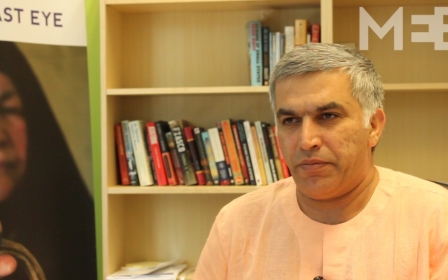Bahraini Human Rights activist charged with 'assaulting a police officer'

Detained Bahrain human rights activist Maryam Alkhawaja has stopped her hungers strike for fear of the stress it would put on her father, fellow human rights activist Abdulhadi Alkhawaja, who is also imprisoned and has been on hunger strike for eight days.
Alkhawaja's Twitter account has now been taken over by a friend who is providing updates on her condition.
According to her feed she is being charged with "insulting the King" and "assaulting the police" and has apparently had her citizenship stripped.
Maryam Alkhawaja is co-director of the Gulf Centre for Human Rights and has been, along with her father, a prominent critic of the Bahraini government and a leading voice in the pro-democracy demonstrations which have gripped Bahrain since 2011.
Ahmed Ali, head of legal affairs for the Bahrain Institute for Rights and Democracy, confirmed to Middle East Eye that she was being charged with "assaulting a police officer" and said the other charges brought up at the public prosecution were not being followed through.
"Maryam Al-Khawaja has been arrested and detained in Bahrain as a reprisal for her human rights work," he told MEE.
"She decided to travel to Bahrain in order to visit her father who has been in a state of arbitrary detention (according to the UN) since 2011, and ended up being arbitrarily detained herself. This is just one example of how Bahrain represses its critics with impunity."
"Maryam is an outstanding advocate for human rights and a voice that should be leading Bahrain, not imprisoned in it."
Human Rights Watch described her arrest as "outrageous" and said it was "unlawful to arbitrarily deny person entry or citizenship".
After her arrest she sent the following message to the Bahrain Center for Human Rights:"If this letter has gone public then it means that the Bahraini authorities have not let me into the country. Due to this, I have decided to launch a water-only hunger strike and to refuse to leave the Bahraini airport. I will continue the hunger strike until I am allowed in to Bahrain to see my father."
"I want to make it clear that I refuse any and all food or treatment during my hunger strike."
Abdulhadi Alkhawaja, who took part in pro-democracy demonstrations during the first months of the Arab Spring, was convicted in June 2011 under anti-terror laws and sentenced to life imprisonment.
Maryam's twitter feed indicated that her family had been able to see her father in jail, in spite of her own arrest and warned that her father, who suffers from diabetes, was in ill health.
Nabeel Rajab, an opposition activist and president of the Bahrain Centre for Human Rights, said her imprisonment was absurd.
"She wanted to see her father, as simple as that," he told Middle East Eye.
"And when she went to Bahrain they didn't allow her to get in!"
He also criticised the government's moves to strip her of her Bahraini citizenship.
“Her family goes back a hundred years before the ruling family came to Bahrain," he told MEE.
"There are hundreds of people who were deported and not allowed to come back to Bahrain by their own government.”
Despite her high profile among the Bahrain opposition, Nabeel said it was unlikely her arrest would attract much attention in the international media.
“If there is no international coverage of what’s going on – and unfortunately I don’t expect much attention in her case – then the government of Bahrain can continue prosecuting human rights defenders and activists and bring them before a court that does not respect human rights," he told MEE.
"So it’s a problem and she’s one of many human rights defenders in jail today.”
Maryam Alkhawaja's arrest comes as the Bahraini appeals court decides to uphold a jail term handed down to award-winning photojournalist Ahmed Humaidan despite appeals by rights group for his release.
"Throwing photographers in jail isn't going to keep either the protests or the accounts of what happens in Bahrain out of the world's sight," Joe Stork of Human Rights Watch said in June.
Bahraini authorities state that the protest movement is violent and backed with weapons by Iran. No evidence has been presented to establish links between the opposition and Iran.
The Persian Gulf Kingdom of Bahrain has been in the grip of an uprising since hundreds of thousands of people, mostly members of the majority Shiite community, took to the streets in February 2011. Three days after demonstrations began, government forces broke up protest camps with teargas, birdshot and batons that left at least two dead and hundreds injured.
Since then activists say around 100 protesters have died in the unrest, although the government disputes these figures and says at least 14 police officers have been killed in attacks on their forces. A national dialogue process between opposition representatives and the government has been stalled since January, due to sharp differences of opinion over the uprising and a failure to agree on a format and agenda for the talks.
Middle East Eye propose une couverture et une analyse indépendantes et incomparables du Moyen-Orient, de l’Afrique du Nord et d’autres régions du monde. Pour en savoir plus sur la reprise de ce contenu et les frais qui s’appliquent, veuillez remplir ce formulaire [en anglais]. Pour en savoir plus sur MEE, cliquez ici [en anglais].




